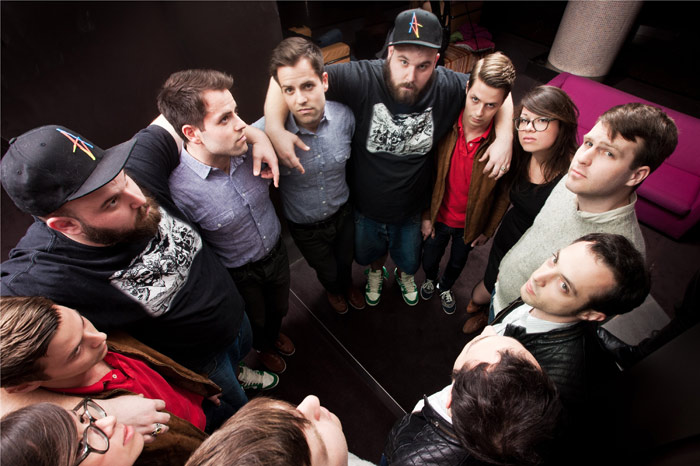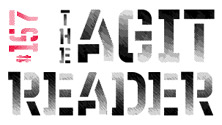
Bigger and Bolder
by Stephen Slaybaugh
Since being born within Toronto’s hardcore community a decade ago, six-piece ensemble Fucked Up have been pushing at the strictures that define the ethos of that strata. Over a extensive slew of singles, the band challenged the genre’s boundaries in terms of form and content, and by the time the group—vocalist Damien Abraham (a.k.a. Pink Eyes), guitarists Mike Haliechuk (a.k.a. 10,000 Marbles), Josh Zucker (a.k.a. Concentration Camp) and Ben Cook (a.k.a. Young Governor), bassist Sandy Miranda (a.k.a. Mustard Gas), and drummer Jonah Falco (a.k.a. Mr. Jo)—released their first full-length in 2006, they had long since ceased being merely a punk band.
Fast forward five years and there are few things more antithetical to punk than a double-album rock opera, but again Fucked Up have shown themselves to truly be unconventional—even when the conventions they are defying are supposedly unconventional. The album, David Comes to Life, follows a loose narrative about a British light bulb factory worker that falls in love with a communist named Veronica who dies in a terrorist bombing. Like its predecessor, the elaborately tracked double-album, The Chemistry of Common Life, the record is a staggering work, and since its release last month, the press has been bestowing it with the same reverence once given to Hüsker Dü’s Zen Arcade. Sure, the album is still festooned with hardcore signposts (Abraham’s growled vocals being the most obvious), but David shows Fucked Up has become a band that, like Hüsker Dü, now transcends categorization.
I caught up with the admittedly reserved Haliechuk, the band’s principle songwriter, over the phone to discuss the band’s progression and new watershed record.
It sounds like you write some of the lyrics and Damien writes some of them. Is that correct?
Mike Haliechuk: Yeah, I actually wrote most of the lyrics on the new record.
Are you very cognizant of the fact that the words that you are writing are going to come growling out of his mouth or does it not matter?
MH: It doesn’t matter. It’s been like that the whole time we’ve been in the band, and it’s not like I’m writing melodies, you know?
I was thinking more in terms of content. Do you think about the lyrics being delivered by him as opposed to if you were to actually sing your own words?
MH: Nah, I’ve never had that much connection to it. I sort of feel like it’s just another instrument, just part of writing the music.
Obviously, there was a good deal of thought put into this record before you made it, but I’m curious how mapped out it was before you went into the studio. Were there things that unfolded or revealed themselves while you were making the record?
MH: In terms of the music, we always do it the same way. We’ll come in with a rough skeleton of what all the parts are going to be like and how they’ll be arranged, but most of what actually makes up the song comes in afterward. We’ll start by making sure we know what the drum parts are and then go into the studio. All the guitars will come afterward—we’ll make most of those up in the studio. We usually don’t write lyrics until we’ve recorded the music. So most of it comes together in the studio afterward.
Given the narrative structure of the album, was it the same way with the lyrics this time or did you have them more thought out?
MH: Nah, we waited really long. We actually didn’t even start talking about the story until we had a few sessions in the studio recording.
And you worked with a producer for the first time, right?
MH: Well, Shane (Stonebeck) has done some production on other things, and he did some production on this one, but we pretty much self-produced as much as we usually do because we were in so many studios with different people. I mean, it went through three or four different studios, so the only constant was us.
Did you feel like you needed someone to help with an endeavor of this undertaking?
MH: Not really. We rearranged things and rewrote parts so many times, we were self-producing before we even started recording. A lot of the songs started out really long and we transposed them many times. Shane helped out a lot in terms of the sound, so he produced in that sense.
I was curious, though, if you needed someone to take care of the technical aspects so you could concentrate on how the whole thing was going to come together.
MH: No, it all happens at the same time—we’re worrying about amps as we’re worrying about what the next part is going to sound like—we do it all at once.
Is it correct that the album stemmed from the song “David’s World” or was there something else that sparked the idea to do this record?
MH:We had always wanted to do a record like this and we had all these characters already written out. We had to make up the story for this record, but all the pieces were already there. A bunch of David 7-inches had come out previously. It was something we had wanted to do for awhile and it was just a good opportunity for us to do it now.
People are already comparing the record to Zen Arcade. Did you have an idea of trying to make a record like that going into it or did you refer to those kinds of albums as reference on how to make a rock opera?
MH: I think we purposefully didn’t listen to any of that stuff just so we would have our own take on it. Obviously, we’ve never written a narrative or a script before, so we didn’t want to rely on anything that might make it contrived or unoriginal. We weren’t really listening to any music or referencing anything while we were making it.
I haven’t seen you perform lately. Are you trying to do it straight through or are you just mixing the songs in with older songs?
MH: I think we’ll try to do it straight through eventually. With the last two records, we ended up doing special shows where we played the whole record. But we only know how to play six or seven songs on this album. We don’t really record as a band so a lot of these songs we’ve never played as the six of us. Right now, we’re just mixing new songs with old standards.
Your live shows have always been sweaty spectacles. When you eventually do the whole album, would you like it to be a sit-down affair so people could absorb the storyline?
MH: One of the ideas we had is doing a version where we’re not really there, like as a musical. It would be cool if we were playing the music, but someone else was singing or there were actors. But I just think that’s so far in the future, it’s hard to think about at this point.
Could you see it going on Broadway a la Green Day?
MH: Maybe if there’s a Broadway in Brooklyn, we could do it there.
Well, Broadway runs through Bushwick.
MH: Yeah, we could do it under the bridge.
Did you always envision the band transcending the hardcore ghetto? I mean, there’s bands that stick with that vernacular for their entire career. Did you always see things going in this direction?
MH: Nah, when we started the band, that’s just who we were—a bunch of young hardcore kids—and that’s the kind of band we formed. We just started becoming interested in more things and we became different people and the music reflected who we were becoming as people.
My friend Matt has a band, Psychedelic Horseshit, and he’s said that while at the same time that their name has stunted their commercial viability, it’s also allowed them to make mistakes. Do you feel like your name has given you a similar freedom?
MH: Maybe, but I think it’s helped us more than it’s hindered us. Like we’ve been in the New York Times and they can’t print our name and are an old, big media institution, but the people that work there and write the stories still want to cover stuff like this. It’s an opportunity for those journalists to fuck with what they’re doing and put a band like us in the paper. In the long run, it’s helped us out.
Do you think that’s a generational thing, where people who came up on punk rock are now in positions of power in media outlets?
MH: Yeah, it’s not rare to find people in the music industry or with media outlets who were punk when they grew up. When they try to bridge the gap is where we come in.
The band seems pretty deliberate in the way you’ve done things, like you waited before you put an album out. That kind of deliberateness goes against the common perception of a punk band. Would you agree with that assessment?
MH: I think we are just more patient than most bands and it’s allowed us to not make as many mistakes as we could have. We waited six years to do a full-length and we made sure we had an aesthetic down before we started putting records out. It may come off as deliberate, but we’re just not in a rush. We’re a bigger band now, but it’s not like we came from nowhere. When we started out, we weren’t looking for a record contract or to go on tour nonstop—it just gradually progressed. We were never desperate for any of these things, so it happened in a natural way that we had more control over.
Having done not only this record, but the one before it, The Chemistry of Common Life, which was pretty elaborate, where do you go from here? Is the idea of making a new album pretty daunting?
MH: No, it was kind of the same thing last time. We got some good press and sold more than we had before, and we’re kind of in the same position. We will tour and write music and it will come together again. I don’t feel like it’s something we need to worry about.
So you’re not feeling any pressure to one-up yourself?
MH: Not yet. Ask me again in three years.
